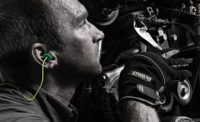In addition to protecting against inhalation of harmful airborne particles, sample units from four models of N95 filtering-facepiece respirators (FFRs) were found to be resistant to fluid penetration by synthetic blood in laboratory tests by the National Institute for Occupational Safety and Health (NIOSH) and an independent testing laboratory. These findings indicate that the NIOSH-approved FFRs likely would meet fluid-resistance requirements that the Food and Drug Administration (FDA) sets for medical masks and surgical N95 respirators. Ultimately, that could increase the supply of respirators for healthcare workers who need protection from occupational exposure to sprays and splashes of blood and other potentially infectious body fluids in public health emergencies like large-scale flu outbreaks.
To mimic workplace conditions, researchers at NIOSH and Nelson Laboratory, in Salt Lake City, UT, used a special type of equipment that sprays synthetic blood at speeds matching those of blood sprayed during a medical procedure. They tested six NIOSH-approved N95 FFR models and five models of medical masks and surgical N95 respirators and found that four of the six NIOSH-approved models of N95 respirators were resistant to the synthetic blood. If larger studies can confirm these findings, the next step is to test whether the devices meet other FDA requirements, such as being fireproof, for medical masks and surgical N95 respirators.
For more information about using N95 FFRs, visit the NIOSH National Personal Protective Technology Laboratory.
To read the journal article, go to Resistance to synthetic blood penetration of NIOSH-approved N95 filtering facepiece respirators and surgical N95 respirators.



